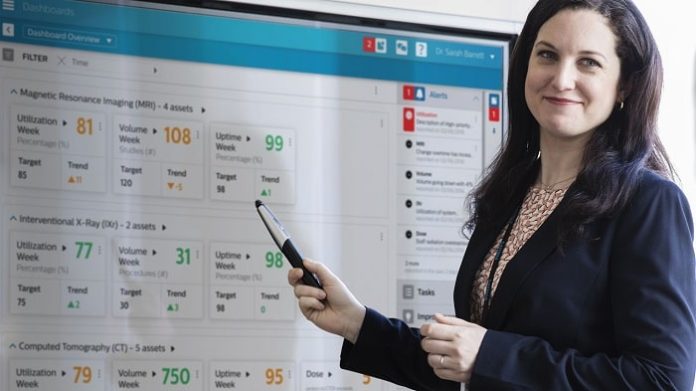Royal Philips, a global leader in health technology, announced its latest introductions in analytics and interoperability solutions at the HIMSS22 Global Health Conference & Exhibition. Philips HealthSuite Interoperability is a fully integrated cloud-enabled Health IT platform to meet diverse workflow needs across the imaging enterprise. Philips Enterprise Performance Analytics – Performance Bridge – now provides operational insights and deep analytics beyond radiology to the cardiology department to enhance efficiencies and help improve effectiveness at the point of care. Both innovations are part of Philips’ Data Management and Interoperability Solutions portfolio [1], an integrated, scalable suite of innovative technology, analytics and professional services, designed to support healthcare providers to continuously improve performance.
“Building on our deep expertise in medical imaging and insights in enterprise informatics, this latest expansion of our Data Management and Interoperability Solutions portfolio will help drive sustainable change across imaging departments with enhanced efficiency and improved outcomes for patients and staff,” said Kees Wesdorp, Chief Business Leader of Precision Diagnosis at Philips. “At HIMSS, we will showcase a highly-customizable set of data-driven solutions, delivering continuous improvement to meet clinical and business performance metrics with real-time insights.”
Advancing precision care with integrated data for meaningful insights
Every second, an exponential amount of healthcare data is generated and mined for valuable insights. Today, approximately 30% of the world’s data volume is being generated by the healthcare industry [2]. Successfully integrating healthcare data is complicated, with multiple user interfaces, complex systems and the slow retrieval of clinically relevant information, all of which hamper workflow efficiency and delay precision care. These challenges have been further exacerbated by COVID-19. At HIMSS, Philips will present how the company’s new Data Management and Interoperability Solutions portfolio is designed to enhance care planning and coordination with clinical and operational analytics to help improve workflow efficiency, patient and staff satisfaction and outcomes.
Vendor-neutral solutions support data from imaging modalities on a common platform
The Data Management and Interoperability Solutions portfolio features two critical components. At HIMSS, Philips will spotlight HealthSuite Interoperability, a fully integrated cloud-enabled health IT platform to meet diverse workflow needs across the imaging enterprise, connecting third-party systems and enabling seamless data workflows to streamline efficiency. This newest version of HealthSuite Interoperability will enable Philips to deliver integrated informatics solutions to help improve clinical workflow, enhance patient care and optimize enterprise management.
The platform will support all relevant data types and formats including DICOM (Digital Imaging and Communications in Medicine) images, genomics, pathology, laboratory data, HL7 (Health Level Seven International) standards, formats and definitions for exchanging and developing electronic health records messages, and FHIR (Fast Healthcare Interoperability Resources) standards. HealthSuite Interoperability will also support all major Electronic Medical Records (EMRs) vendors. Its clinical data repository also offers customers the ability to store and manage granular data, and can be used to create value driving solutions like health image exchanges.
Expanding beyond radiology to feature new cardiology analytics to enhance workflow
Philips’ Data Management and Interoperability Solutions also features the company’s newest enhancements in Enterprise Performance Analytics – Performance Bridge – expanding operational insights and deep analytics beyond radiology to the cardiology department to enhance efficiencies and help improve effectiveness at the point of care. Philips Enterprise Performance Analytics – Performance Bridge – gives healthcare professionals access to near real-time data on departmental performance through an easy-to-use interactive dashboard. Its operational insights have driven performance improvements in multiple health systems including Miami Cardiac and Vascular Institute, where 100% of staff surveyed stated the Performance Bridge Patient Flow applications saves time in their workday and improves teamwork and communication [3]. Additionally, Kootenai Health in Idaho has leveraged the near real-time insights of Performance Bridge to improve their Cath Lab operations. Within 3 years, they have documented an increase in radial access rates associated with fewer complications, including major bleeding and mortality, from 9% to 42%, while improving patient comfort and shortening recovery times.
With these newest enhancements, cardiology departments now have access to critical metrics to support operational performance monitoring in an invasive procedural setting such as the interventional suite, providing data on procedure volumes, room utilization, procedure duration and lab turnaround time.
Cardiology departments can also access key metrics designed to support operational performance monitoring in a non-invasive procedural setting such as cardiac imaging suites, most notably echocardiography, with access to data on procedure volumes, modality/machine utilization, study type counts and report turnaround time. This newest release further demonstrates Philips’ commitment to bring together the right combination of services and tools to measure and monitor key areas of improvement to help drive continuous improvement in radiology and cardiology departments to optimize operations, enhance workflow efficiencies and improve patient outcomes.
About Royal Philips
Royal Philips is a leading health technology company focused on improving people’s health and well-being, and enabling better outcomes across the health continuum – from healthy living and prevention, to diagnosis, treatment and home care. Philips leverages advanced technology and deep clinical and consumer insights to deliver integrated solutions. Headquartered in the Netherlands, the company is a leader in diagnostic imaging, image-guided therapy, patient monitoring and health informatics, as well as in consumer health and home care. Philips generated 2021 sales of EUR 17.2 billion and employs approximately 78,000 employees with sales and services in more than 100 countries.























